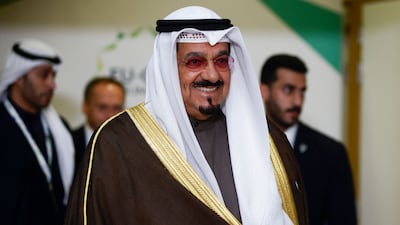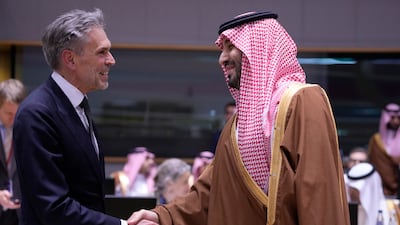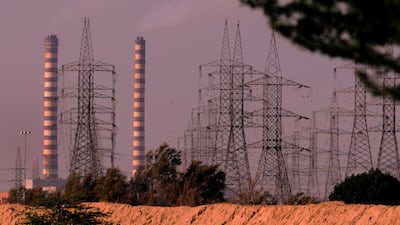Arab countries will sign an agreement in Cairo next week to pave the way for power trading between the GCC and the broader Middle East and North Africa region.
One of the most important agenda items at an Arab ministerial meeting in the Egyptian capital will be the signing of the pan-Arab electricity market agreement, “which will set in motion the possibility of trading between the GCC and [other] Arab countries”, Ahmed Al Ebrahim, chief executive of the GCC Interconnection Authority, told The National during the RAK Energy Summit in Ras Al Khaimah.
Mr Al Ebrahim also said an electricity interconnection project linking Iraq with the GCC grid is expected to start operations in 2025.
“We're planning to start exporting electricity to Iraq next year. We are having our discussions with the Iraqi side on all the agreements and all the details,” he said.
“That will be a good start for the GCC countries now with the energy transition, on how to utilise the excess capacity coming from renewables to sell to other regions who are in need.”
The GCC, comprising Bahrain, the UAE, Kuwait, Saudi Arabia, Qatar and Oman, commissioned a study in 1986 on the idea of connecting electricity grids across the Middle East.
Subsequent studies laid out a road map and in 2001, the GCCIA was formed. By 2011, all GCC countries were connected, with the exception of Oman, which was linked up the following year.
A project to connect Saudi Arabia with Egypt undertaken by the Saudi Electricity Company is in an “advanced stage” and may be completed next year or in 2026, Mr Al Ebrahim said. It would allow for 3,000 megawatts of electricity to be exchanged between the two countries.
Asked if the GCC would be the main power supplier to a pan-Arab grid, Mr Al Ebrahim said it would depend on availability and pricing. "It's not always one side selling to the other side but it's dynamic, depending on the potential in the market," he said.
"We in the GCC have very similar peak times [and] connecting with other regions like Egypt ... will [result in] a window of opportunity to export and maybe sometimes import."
By connecting a number of grids, a failure in one region can be mitigated by drawing power from others, reducing the likelihood of widespread blackouts.
Countries such as Lebanon, Egypt and Iraq have been facing severe and prolonged power cuts due to ageing infrastructure, fuel shortages and surging demand during the summer.
The agreement will be signed against the backdrop of soaring geopolitical tension in the Middle East, which have severely affected some economies and raised questions about the feasibility of certain long-term infrastructure projects involving countries from the region.
However, there is a strong "political will" in the GCC to establish an interconnected power grid, Mr Al Ebrahim said.
"We have all the support we need from the GCC and the Arab world," he added. "Most of the Arab countries are also supporting it, especially Egypt, Jordan, Morocco and some of the others."
The long-term vision is to have an interconnected global power grid, which will enable electricity to be generated in any region, such as Asia, Africa or Europe, and then transmitted to areas of high demand, the official said.
For instance, India and the UAE are in "serious discussions" to link their electricity grids, Mr Al Ebrahim said, without providing further details.
Last year, Indian media reported that the world's most populous country was considering linking its power grid to those of Saudi Arabia and the Emirates through undersea cables.
How to apply for a drone permit
- Individuals must register on UAE Drone app or website using their UAE Pass
- Add all their personal details, including name, nationality, passport number, Emiratis ID, email and phone number
- Upload the training certificate from a centre accredited by the GCAA
- Submit their request
What are the regulations?
- Fly it within visual line of sight
- Never over populated areas
- Ensure maximum flying height of 400 feet (122 metres) above ground level is not crossed
- Users must avoid flying over restricted areas listed on the UAE Drone app
- Only fly the drone during the day, and never at night
- Should have a live feed of the drone flight
- Drones must weigh 5 kg or less
Squid Game season two
Director: Hwang Dong-hyuk
Stars: Lee Jung-jae, Wi Ha-joon and Lee Byung-hun
Rating: 4.5/5
Our family matters legal consultant
Name: Hassan Mohsen Elhais
Position: legal consultant with Al Rowaad Advocates and Legal Consultants.
How to turn your property into a holiday home
- Ensure decoration and styling – and portal photography – quality is high to achieve maximum rates.
- Research equivalent Airbnb homes in your location to ensure competitiveness.
- Post on all relevant platforms to reach the widest audience; whether you let personally or via an agency know your potential guest profile – aiming for the wrong demographic may leave your property empty.
- Factor in costs when working out if holiday letting is beneficial. The annual DCTM fee runs from Dh370 for a one-bedroom flat to Dh1,200. Tourism tax is Dh10-15 per bedroom, per night.
- Check your management company has a physical office, a valid DTCM licence and is licencing your property and paying tourism taxes. For transparency, regularly view your booking calendar.
Abu Dhabi traffic facts
Drivers in Abu Dhabi spend 10 per cent longer in congested conditions than they would on a free-flowing road
The highest volume of traffic on the roads is found between 7am and 8am on a Sunday.
Travelling before 7am on a Sunday could save up to four hours per year on a 30-minute commute.
The day was the least congestion in Abu Dhabi in 2019 was Tuesday, August 13.
The highest levels of traffic were found on Sunday, November 10.
Drivers in Abu Dhabi lost 41 hours spent in traffic jams in rush hour during 2019
Squads
India: Kohli (c), Rahul, Shaw, Agarwal, Pujara, Rahane, Vihari, Pant (wk), Ashwin, Jadeja, Kuldeep, Shami, Umesh, Siraj, Thakur
West Indies: Holder (c), Ambris, Bishoo, Brathwaite, Chase, Dowrich (wk), Gabriel, Hamilton, Hetmyer, Hope, Lewis, Paul, Powell, Roach, Warrican, Joseph
EA Sports FC 24
Company%20Profile
%3Cp%3E%3Cstrong%3ECompany%20name%3A%3C%2Fstrong%3E%20Cargoz%3Cbr%3E%3Cstrong%3EDate%20started%3A%3C%2Fstrong%3E%20January%202022%3Cbr%3E%3Cstrong%3EFounders%3A%3C%2Fstrong%3E%20Premlal%20Pullisserry%20and%20Lijo%20Antony%3Cbr%3E%3Cstrong%3EBased%3A%3C%2Fstrong%3E%20Dubai%3Cbr%3E%3Cstrong%3ENumber%20of%20staff%3A%3C%2Fstrong%3E%2030%3Cbr%3E%3Cstrong%3EInvestment%20stage%3A%3C%2Fstrong%3E%20Seed%3C%2Fp%3E%0A
The Byblos iftar in numbers
29 or 30 days – the number of iftar services held during the holy month
50 staff members required to prepare an iftar
200 to 350 the number of people served iftar nightly
160 litres of the traditional Ramadan drink, jalab, is served in total
500 litres of soup is served during the holy month
200 kilograms of meat is used for various dishes
350 kilograms of onion is used in dishes
5 minutes – the average time that staff have to eat
White hydrogen: Naturally occurring hydrogen
Chromite: Hard, metallic mineral containing iron oxide and chromium oxide
Ultramafic rocks: Dark-coloured rocks rich in magnesium or iron with very low silica content
Ophiolite: A section of the earth’s crust, which is oceanic in nature that has since been uplifted and exposed on land
Olivine: A commonly occurring magnesium iron silicate mineral that derives its name for its olive-green yellow-green colour
Dengue%20fever%20symptoms
%3Cp%3EHigh%20fever%20(40%C2%B0C%2F104%C2%B0F)%3Cbr%3ESevere%20headache%3Cbr%3EPain%20behind%20the%20eyes%3Cbr%3EMuscle%20and%20joint%20pains%3Cbr%3ENausea%3Cbr%3EVomiting%3Cbr%3ESwollen%20glands%3Cbr%3ERash%26nbsp%3B%3C%2Fp%3E%0A











